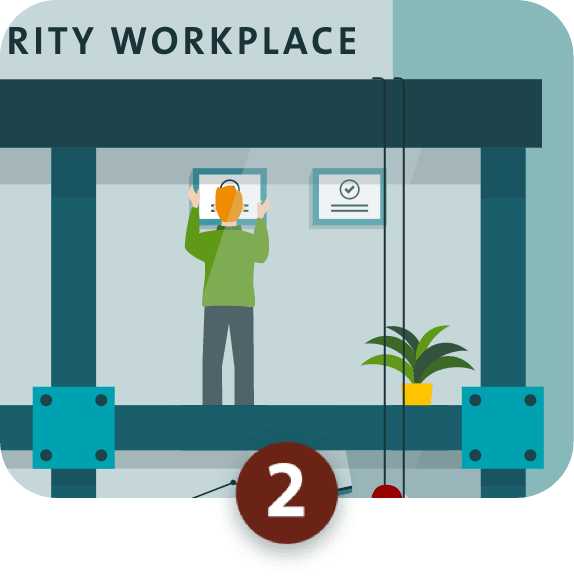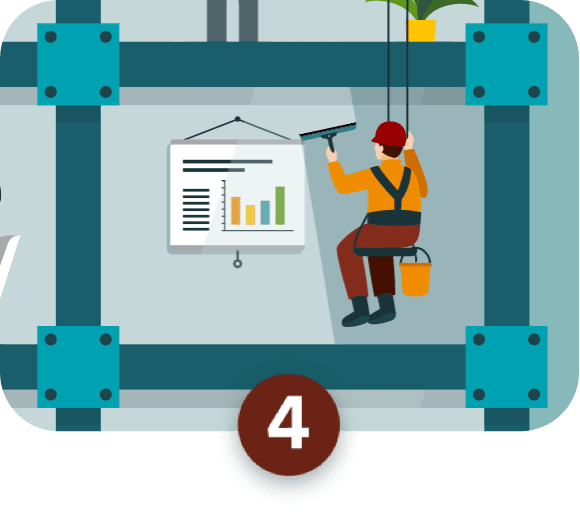Welcome to the Integrity Workplace
This interactive presents an integrity framework for the public sector to put integrity at the core of how public organisations operate.
This integrity framework aims to support senior leaders and those in governance roles to take a whole-of-organisation approach to building and maintaining a culture of integrity. It is focused on reducing any gap between the culture an organisation wants to have and its actual practice. The framework provides an integrated approach to examining the values, systems, and norms in a workplace.
The framework is made up of three components.
All the components are required and need to reinforce each other. They should be explicitly designed and monitored as a coherent system of improvement.
Click on any of the components below to find out more:
The six ways of working represent how a public organisation can go about doing the work. They help build an organisation that has integrity in all the ways it operates.
123456
The nine building blocks represent what a public organisation should have in place. They are the key activities that, when connected, lead to the best results in strengthening an organisation’s integrity system.
Continuous improvement Integrity is not a destination; it is a process whereby an organisation continually looks for ways to do better.
A statement of values
A statement of what your organisation stands for and the culture you seek.
A statement of values provides a shared understanding of, and commitment, to "what your organisation stands for". Each organisation needs to put integrity in its own context in relation to its vision and purpose and the core values to which it is committed and wishes to be held accountable.
Establishing organisational values begins with a clear understanding of the overall organisational purpose.
It is not enough just to have values. There also needs to be a process to work through what the values look like in practice.
This gives all staff a shared understanding of what each value means and looks like, and what they are being held accountable for.
Ethical leadership
The visible practising and role-modelling of ethical behaviour.
Ethical leadership improves the ethical behaviour and well-being of individuals and the collective. Ethical leadership means that the person exercising that leadership is well grounded in a set of values and beliefs that are seen as ethical. This is important not just at senior leadership level but for all individuals with leadership roles in a workplace.
Ethical leaders are committed to their organisation's vision and values, and their behaviours and decision-making reflect this.
Ethical leadership requires persistence to "do the right thing" despite any challenges faced.
A code of conduct
A translation of the values into behaviours.
A code builds a shared understanding of expected behaviours and fosters responsibility and accountability. A code of conduct defines how all staff should act, day to day. It should contain clear expectations that reflect an organisation’s daily operations, core values, and culture.
If staff members face an integrity problem, the code should help them exercise their own judgement, taking into consideration the individual circumstances of the situation, and arrive at a well-founded decision.
A code needs to be supported. This includes making avenues available to staff to raise specific questions or ethical dilemmas, a programme of communication and training, and leadership exhibiting the core values and desired behaviours.
Policies and procedures
Values embedded into the day-to-day activities and long-term culture of an organisation.
Policies and procedures build trust in the organisation by establishing processes that everyone is required to follow. An organisation’s policies should have a clear purpose that is based on their values.
Policies and procedures should make it easy for staff to know what they need to do in different circumstances. The process for ensuring that staff are complying with policies should be clear. Policies and procedures should be tailored to an organisation’s specific function, capabilities, and risks including integrity risks.
People processes
Organisational values are factored into, and reinforced by, the behaviours that organisations recruit for, reward, and encourage.
The organisation's values should be integrated throughout all parts of the employee lifecycle (recruitment, induction and orientation, performance assessment and learning and development, and career development) to encourage, reward, and monitor ethical behaviour of all staff.
When considering a person's performance in their role, ensuring that their behaviour aligns with the organisation’s values is as important, or potentially more so, than what they have achieved.
Listen up / speak up
When someone speaks up, the organisation listens and responds appropriately.
Listen up/speak up is an essential feedback loop about the health of your organisation. It protects people and resources. Management and senior staff need to be seen to be listening and taking action to resolve issues in an appropriate and timely manner. This builds trust in the system. Organisations need to show their commitment to creating an environment that prioritises the safety and well-being of those raising concerns or complaints. For there to be open and honest communication, individuals need to believe that the system will work with them.
Integrity roles and responsibilities
Roles and responsibilities for managing integrity are assigned across the whole organisation.
Sustained improvement to organisational integrity requires ongoing commitment, focus, and resources. It is important that each of the elements of this framework are well described and sit clearly within someone's responsibility in the organisation. As well as that, it should be someone's role to bring together all the different parts of an integrity system (or framework) to monitor and measure progress at an organisational level.
The allocation of integrity roles and responsibilities will need to reflect the size, scale, and complexity of an organisation's operations and the type of integrity risks it faces.
Measuring and reporting progress
Evaluating whether the desired culture is being demonstrated and can be seen through staff behaviours and work processes.
Measuring and reporting progress strengthens commitment and drives improvement. Ensuring that a culture of integrity is an integral part of the day-to-day running of an organisation requires regular monitoring and reporting, not only of compliance with policies and processes but also monitoring the “health” of the organisational culture. This requires a focus not only on what is done but also on how things are done.
Assurance and accountability
Adequate independent oversight "of the whole" by those charged with governance.
Measuring and reporting progress strengthens commitment and drives improvement. Ensuring that a culture of integrity is an integral part of the day-to-day running of an organisation requires regular monitoring and reporting, not only of compliance with policies and processes but also monitoring the "health" of the organisational culture. This requires a focus not only on what is done but also on how things are done.

Continuous improvement
The culture of an organisation will change and evolve in response to changing circumstances or work pressures. Policies and practices need to be regularly reviewed, lessons need to be learned and fed back into systems improvements, and changes need to be communicated to ensure transparency and accountability.

Ongoing commitment
To achieve and maintain a culture of integrity, there must be strong commitment from leadership that integrity is at the core of an organisation – the foundation that everything else is built on.
Leaders are always being watched - their actions and behaviour influence the culture of an organisation more than policies or processes ever can. When all leaders in an organisation collectively commit to take every opportunity to demonstrate the values of their organisation and emphasise the importance of integrity, they can have a significant impact.
Such a commitment must be authentic and consistent, regardless of the pressures that leaders are under. However, integrity in a workplace is not just the responsibility of leaders, it is important that it is everyone's responsibility.

Build alignment
The vision, values, and expected behaviours of an organisation should be consistently reflected in all its policies, processes, and controls even in times of pressure. Staff should not be given tasks that can be achieved only if some aspect of the integrity system is compromised.
Building alignment also requires working in a co-ordinated way across the organisation, with everyone working towards the organisation's commonly understood and shared purpose.

Prioritise relationships
Cultures are forged on relationships and play out through the different networks in a workplace - individual engagement, group dynamics, relationships among groups, and interactions with external organisations. Efforts to change culture need to consider the way relationships are formed and maintained between and within groups in the workplace as these can directly affect trust - positively or negatively.
Workplaces with a strong culture of integrity focus on improving honest, trustful, respectful, and open relationships. They enable difficult conversations where needed and encourage respect and diversity of thought. This can also be expressed by the tikanga concept of manaaki, to look after the mana of others by showing respect, hospitality, generosity, and care for others.

Provide transparency
Integrity depends on transparent processes and decision-making. Transparency requires workplaces to be open about actions taken, decisions made, processes being put in place, and progress being made. Leaders who show a willingness to explain decisions or have them reviewed help demonstrate fairness and equity in the organisation.
This is important externally too. Organisations need to be transparent in sharing data, information, knowledge, and insights about their performance. Openly monitoring and reporting on performance supports accountability.

Make it easy
Achieving a culture of integrity for an entire organisation is not easy. It is important to understand what behaviours in an organisation are encouraged, intentionally or not, to ensure that unforeseen barriers are not created.
Behavioural research shows that there is often a gap between our intentions and our behaviours. Some of this can be put down to "friction costs" - the things that make a task more difficult to complete. Making integrity easy in a workplace means designing processes and policies around people and ensuring that it is easy to "do the right thing".
Seeking feedback from staff about what is working and what is not can help to ensure that a workplace's systems and processes are easy to navigate and make it clear what is expected.

Be inclusive
Staff participation is essential for effective and positive changes to a workplace's culture. Workplaces that encourage and value the participation of staff in decision-making processes supports strong performance, innovation, organisational resilience, organisational integrity, and better staff well-being.
Continuous improvement
The culture of an organisation will change and evolve in response to changing circumstances or work pressures.
Policies and practices need to be regularly reviewed, lessons need to be learned and fed back into systems improvements, and changes need to be communicated to ensure transparency and accountability.
